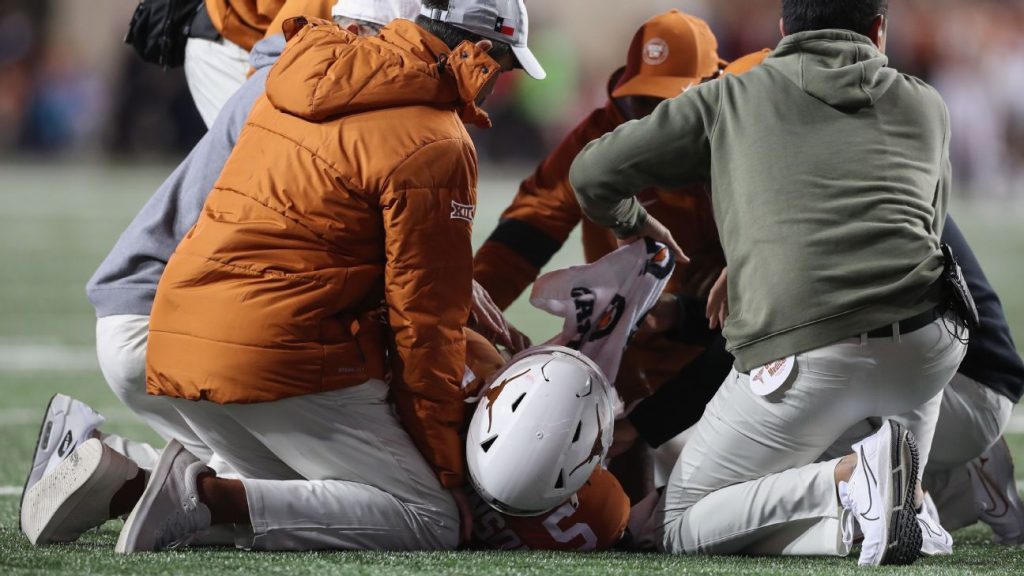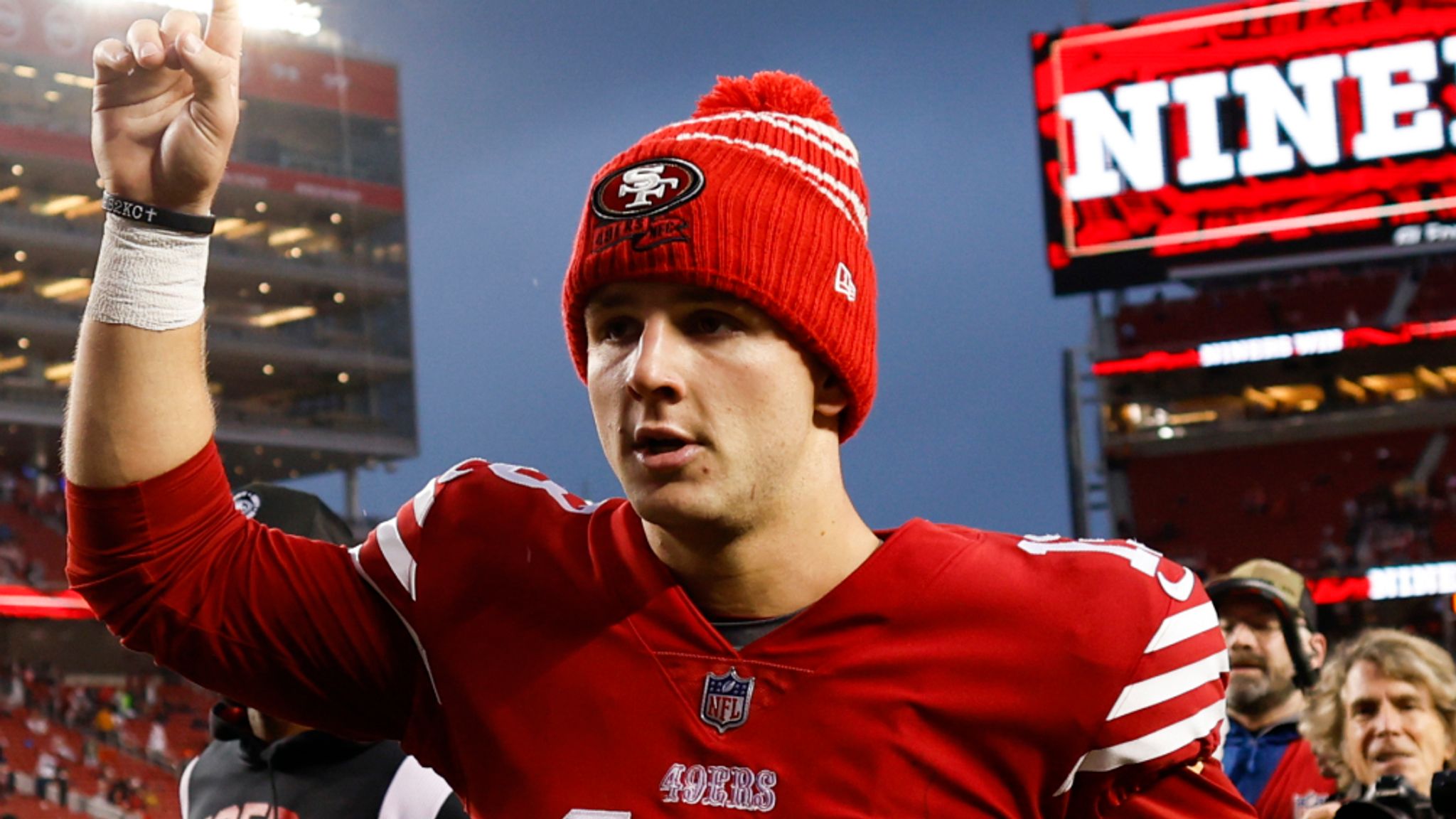
### Quinn Ewers’ Injury and Its Impact on Texas Longhorns
The Texas Longhorns’ 2024 football season has been significantly impacted by a major blow: the injury of their star quarterback, Quinn Ewers. As one of the team’s most pivotal players, Ewers was expected to lead the Longhorns through a challenging schedule and push them towards a successful season. However, an abdominal injury suffered early in the season has cast a shadow of uncertainty over both his immediate playing status and the team’s prospects moving forward. This injury not only threatens to derail the Longhorns’ season but also raises broader concerns about the team’s ability to compete at the highest level against tougher opponents without their offensive leader.
### The Nature of the Injury
Quinn Ewers’ injury occurred during a high-stakes game where the Longhorns were already facing intense pressure. A routine play took a wrong turn, and Ewers took a hit that immediately signaled something was wrong. He was seen clutching his abdomen and was quickly evaluated by the team’s medical staff. Although initial reports were hopeful that the injury might be minor, subsequent examinations revealed a more serious abdominal strain that would require him to miss several crucial weeks of the season.
Abdominal injuries, especially for quarterbacks, are particularly problematic due to the constant need for core strength in every aspect of play—throwing, scrambling, and absorbing hits. For Ewers, the injury has significantly limited his mobility and throwing ability, making it unsafe for him to participate in full-contact practices or games. This absence has disrupted the team’s offensive rhythm and has raised concerns about how the Longhorns will manage without their star quarterback at the helm.
### The Immediate Impact on the Longhorns’ Offense
The loss of Quinn Ewers has created an immediate and noticeable void in the Texas Longhorns’ offensive scheme. Ewers is known for his strong arm, quick decision-making, and leadership on the field—qualities that are hard to replicate. His ability to read defenses, make accurate throws under pressure, and lead game-winning drives has been a cornerstone of the Longhorns’ game plan. Without him, the team has struggled to find its footing, often appearing disjointed and lacking the confidence that Ewers brings to the huddle.
Ewers’ absence has forced the coaching staff to turn to backup quarterbacks, who, while talented, lack the experience and poise that Ewers provides. The backup quarterbacks have shown flashes of potential but have also been prone to mistakes, including turnovers and missed opportunities in critical moments. This inconsistency has hampered the Longhorns’ ability to sustain drives, control the tempo of games, and capitalize on scoring opportunities. The offensive line, already under pressure, now faces an even greater challenge as they try to protect less seasoned quarterbacks who may not have the same pocket awareness and escape ability as Ewers.
The ripple effects extend to the entire offense. The running game has also suffered as opposing defenses, no longer needing to respect the deep passing threat that Ewers provides, have stacked the box to stop the run. Receivers, who thrived on Ewers’ ability to make accurate throws downfield, are seeing fewer opportunities and have struggled to create separation without the threat of Ewers’ arm. As a result, the Longhorns’ offensive production has dipped noticeably, and the team has been forced to rely more heavily on its defense to keep games within reach.
### Strategic Adjustments and Challenges
Head coach Steve Sarkisian and his staff have been tasked with making strategic adjustments to mitigate the impact of Ewers’ absence. This has included simplifying the offensive playbook, emphasizing shorter passes and quick reads to protect the backup quarterbacks from making costly mistakes. The coaching staff has also placed a greater emphasis on the running game and designed plays that allow the quarterbacks to use their legs when passing options are limited.
However, these adjustments have not fully compensated for the loss of Ewers’ dynamic playmaking ability. Opposing defenses have quickly adapted, often daring the Longhorns to beat them through the air with unproven quarterbacks. The lack of a deep threat has made it easier for defenses to crowd the line of scrimmage, stifling the running game and making it difficult for the Longhorns to generate explosive plays.
Another challenge has been maintaining team morale. The Longhorns entered the season with high expectations, fueled in large part by Ewers’ talent and leadership. His injury has not only impacted the team’s performance on the field but has also taken an emotional toll on the players. Teammates have had to rally and find new sources of leadership, often looking to veterans on the defensive side of the ball to fill the void left by Ewers.
### The Road Ahead: Tougher Opponents Looming
As the Longhorns look ahead, the road does not get any easier. The schedule features a series of tough opponents, including several highly ranked teams that will test Texas at every level. Without Ewers, the Longhorns face an uphill battle to stay competitive in these matchups. The margin for error has become razor-thin, and each game now carries even greater significance as Texas tries to navigate the remainder of the season without its star quarterback.
The coaching staff is hopeful that Ewers can make a return before the season’s end, but there is no guarantee. Abdominal injuries are notoriously tricky, and any setback in his recovery could prolong his absence. Even if Ewers is able to return, there will be questions about his readiness and whether he can immediately regain his pre-injury form.
### Long-Term Implications for the Program
Ewers’ injury also raises longer-term concerns for the Texas football program. Beyond the immediate impact on this season, there are questions about how the team will manage its quarterback situation moving forward. Ewers was seen not just as the leader of this year’s team but also as the centerpiece of the program’s future. His injury has highlighted the need for depth at the quarterback position and the importance of developing backup players who can step in without a significant drop-off in performance.
The injury also serves as a stark reminder of the fragility of a football season. A team’s fortunes can change in an instant, and the Longhorns now find themselves at a crossroads, needing to regroup and adapt in the face of adversity. For Quinn Ewers, the journey back to the field will require patience, resilience, and a commitment to the rigorous rehab process. For the Texas Longhorns, the challenge is to find a way to stay competitive without their star player and to continue fighting for every win in a season that has taken an unexpected and devastating turn.







